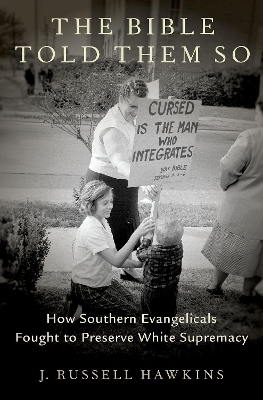
The Bible Told Them So
How Southern Evangelicals Fought to Preserve White Supremacy
Seiten
2021
Oxford University Press Inc (Verlag)
978-0-19-757106-4 (ISBN)
Oxford University Press Inc (Verlag)
978-0-19-757106-4 (ISBN)
Why did southern white evangelical Christians resist the civil rights movement in the 1950s and 1960s? Simply put, they believed the Bible told them so. These white Christians entered the battle certain that God was on their side. Ultimately, the civil rights movement triumphed in the 1960s and, with its success, fundamentally transformed American society. But this victory did little to change southern white evangelicals' theological commitment to segregation. Rather than abandoning their segregationist theology in the second half of the 1960s, white evangelicals turned their focus on institutions they still controlled--churches, homes, denominations, and private colleges and secondary schools--and fought on.
Focusing on the case of South Carolina, The Bible Told Them So shows how, despite suffering defeat in the public sphere, white evangelicals continued to battle for their own institutions, preaching and practicing a segregationist Christianity they continued to believe reflected God's will. Increasingly caught in the tension between their sincere belief that God desired segregation and their reluctance to give voice to such ideas for fear of being perceived as bigoted or intolerant, by the late 1960s southern white evangelicals embraced the rhetoric of colorblindness and protection of the family as measures to maintain both segregation and respectable social standing. This strategy set southern white evangelicals on an alternative path for race relations in the decades ahead.
Focusing on the case of South Carolina, The Bible Told Them So shows how, despite suffering defeat in the public sphere, white evangelicals continued to battle for their own institutions, preaching and practicing a segregationist Christianity they continued to believe reflected God's will. Increasingly caught in the tension between their sincere belief that God desired segregation and their reluctance to give voice to such ideas for fear of being perceived as bigoted or intolerant, by the late 1960s southern white evangelicals embraced the rhetoric of colorblindness and protection of the family as measures to maintain both segregation and respectable social standing. This strategy set southern white evangelicals on an alternative path for race relations in the decades ahead.
J. Russell Hawkins is Professor of Humanities and History in the John Wesley Honors College at Indiana Wesleyan University in Marion, Indiana.
Acknowledgments
Introduction: "As Old as the Scriptures"
Chapter One: Not in Our Church: Congregational Backlash to Brown v. Board of Education
Chapter Two: The Bounds of Their Habitation: The Theological Foundation of Segregationist Christianity
Chapter Three: Jim Crow on Christian Campuses: The Desegregation of Furman and Wofford
Chapter Four: Embracing Colorblindness: The Methodist Merger and the Transformation of Segregationist Christianity
Chapter Five: Focusing on the Family: Private Schools and the New Shape of Segregationist Christianity
Epilogue: The Heirs of Segregationist Christianity
Index
| Erscheinungsdatum | 02.06.2021 |
|---|---|
| Verlagsort | New York |
| Sprache | englisch |
| Maße | 163 x 236 mm |
| Gewicht | 454 g |
| Themenwelt | Geisteswissenschaften ► Geschichte ► Regional- / Ländergeschichte |
| Geisteswissenschaften ► Religion / Theologie ► Christentum | |
| Sozialwissenschaften ► Ethnologie | |
| Sozialwissenschaften ► Soziologie | |
| ISBN-10 | 0-19-757106-9 / 0197571069 |
| ISBN-13 | 978-0-19-757106-4 / 9780197571064 |
| Zustand | Neuware |
| Haben Sie eine Frage zum Produkt? |
Mehr entdecken
aus dem Bereich
aus dem Bereich
Erinnerungen
Buch | Softcover (2024)
Pantheon (Verlag)
CHF 22,40
Universalgelehrter, Polarreisender, Entdecker
Buch | Hardcover (2024)
mareverlag
CHF 39,20


